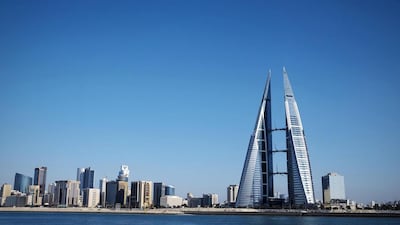Climate change is inflicting damaging losses in the Middle East and Central Asia (Meca) and a 1°C rise in temperature in five of the hottest regional countries translates to an immediate decline in per capita economic growth of around 2 percentage points.
Over the past three decades, temperatures in the region have risen by 1.5°C — twice the global increase of 0.7°C — which is particularly harmful for hotter countries including Bahrain, Djibouti, Mauritania, Qatar and the UAE, the International Monetary Fund said.
“According to our analysis, climate disasters in the [Meca] region reduce annual economic growth by 1 to 2 percentage points on a per capita basis,” Jihad Azour, IMF director for the Middle East and Central Asia Department and Christoph Duenwald, who co-ordinates the Washington-based fund's climate efforts in the region, said in a blog on Wednesday.
“These events are expected to become more common and more severe as the planet heats up.”
Poor and conflict-affected countries in the region have suffered the most from rising temperatures and extreme weather events. In any given year since 2000, climate disasters have killed more than 2,600 people, affected seven million others and caused $2 billion in direct material damage.
With temperatures still rising, adaptation of the right policies has become a pressing priority and underscores the need for international support to finance that adaptation, IMF officials said.
Nations across the globe are pushing to meet the 2015 Paris Agreement mandate to bring temperatures down to just 1.5°C above pre-industrial levels and limit the amount of greenhouse gases emitted by human activity to the same levels that trees, soil and oceans can absorb naturally.
However, to cut greenhouse emissions by about 51 billion tonnes per year and meet carbon neutrality goals by the middle of the century, the world requires about $50 trillion in incremental investments.
In October, the IMF urged the $50tn global investment funds industry to step up efforts to finance the transition to a greener economy and help mitigate the effects of climate change.
The need for financing for poor and conflict-ravaged countries is far more pressing. Developed nations have agreed to generate $100bn in climate finance to assist poor countries each year — but have yet to deliver on that pledge.
Countries with low climate resilience, such as Afghanistan, Somalia, and Sudan, as well as Pakistan, a lower-middle income nation, have suffered intensely with more people being killed or affected by climate-related events.
“Tapping additional domestic revenue can play an important part in supporting spending on climate adaptation while reducing any increase in public debt. But countries also require greater international support to finance adaptation, ideally on concessional terms, as well as transfers of expertise and technology to develop their own capacity to adapt to climate change,” Mr Azour and Mr Duenwald said.
Between 2009 and 2019, bilateral and multilateral organisations provided about $70bn in climate finance to the Meca region. However, a large proportion was for “mitigation initiatives and only around a quarter solely for adaptation”.
“Estimated adaptation needs are much greater,” they said.
Most countries in the region now recognise climate adaptation as a pressing issue and have started to address climate challenges. However, priority should be given to measures that are “highly beneficial under all plausible climate-change scenarios” and building capacity to adapt to future climate challenges.
“There is no one-size-fits-all solution, because each country faces its own set of challenges, but some common principles apply to the whole region,” IMF officials said.
The fund is supporting its member countries in their efforts with policy advice, capacity development and lending. Its proposed $50bn Resilience and Sustainability Trust will further support reforms that increase countries’ resilience to climate change, they said.
Gulf countries are already taking steps to tackle climate change.
Saudi Arabia and the UAE announced initiatives to reach net zero emissions by the middle of the century as part of their nationally determined contributions in line with the Paris Agreement.
The UAE, the first Arab nation to commit to achieving net zero, aims to reach that milestone by 2050. In line with its initiative to decarbonise, the Emirates plans to invest $160bn in clean and renewable energy sources in the next three decades.
Saudi Arabia aims to offset its domestic emissions by 2060, with the kingdom's state-owned energy company, Saudi Aramco, set to achieve net zero by 2050.


